Student Ambassadors
Speaking with a student ambassador is a great way to get a previous student’s perspective on the Language Schools experience.
If you would like to connect with a student ambassador to ask questions, please contact Oliver Carling, School of Russian Assistant Director, at schoolofrussian@middlebury.edu.
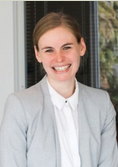
Jess Combs
Hometown: Vitoria-Gasteiz, Alva, Spain
Program: 8-week immersion
Level: 4
Current: Freelance Translator
What surprised you about your experience at the Middlebury Language Schools?
I was most surprised that I was able to speak with students in higher levels than mine. All levels focused on the same general topics, so even as a level four student I was able to listen to and participate in conversations with level seven students. I was also surprised to not be the only 30 something in the program.
Why did you choose to study at the Middlebury Language Schools?
The Middlebury Language Schools are well-known and well-respected in the translation industry. I also knew there was no other way to improve so much in such a short period of time.
Please describe how your language skills improved due to your studies at Middlebury.
My language skills improved immensely thanks to my studies at Middlebury. When I got back from the program my online Russian teacher was stunned at how well I was able to express myself and pleased that she was able to speak to me much more naturally. I plan on continuing those online classes until I feel confident enough to sign up for the UN translation exam. My goal is to pass the exam by 2021.
What advice would you give someone wanting to attend the School of Russian?
It’s a lot of work, but it’s also really fun! There are activities available to suit all interests.
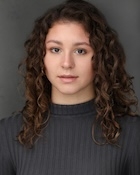
Madeline Fyock
Hometown: Greenville, SC
Program: 8-week immersion
Level: 5, 7
Current: Student at the University of South Carolina
What surprised you about your experience at the Middlebury Language Schools?
At the Middlebury Language Schools, I was surprised by the community and fellowship that developed among the students, professors, and bilinguals. I expected to not make any friends and just spend my time studying, but I actually made a lot of friends by participating in soccer and choir. These friendships lasted well beyond the summer and have remained constant parts of my life. I call or text many of my friends from Middlebury weekly and visit them whenever I am able. At the School of Russian, I not only deepened my knowledge of Russian but also made some life-long friends.
Why did you choose to study at the Middlebury Language Schools?
I initially chose to study at the Middlebury Language Schools because I was interested in the Language Pledge and how it would influence my language skills; I expected that they would be challenged and refined through the difficulty of the program. I sought the rigor and intensity of the Middlebury Language Schools in my pursuit of linguistic excellence.
Please describe how your language skills improved due to your studies at Middlebury.
As with most things, practice makes perfect (or, at least, better). Since the Language Pledge was in effect at all times, even conversations outside of class allowed me to practice my language skills. While I still make mistakes, I am definitely more comfortable and confident speaking in Russian.
Describe your typical day at the School of Russian.
At the School of Russian, I woke up around 6 a.m. to either run with friends or study. After this, I showered and headed to breakfast. At 9 a.m., I walked to my classes, which focused on a variety of topics such as economic crises, protests, war, U.S. –Russia relations, corruption, nationalism, immigration, and “anti-utopia. ” We discussed any readings, documentaries, or films that were assigned the day prior. After class, I ate lunch. Meals were some of my favorite times at Middlebury because I got to meet other students and hear more about their experiences and interests. In the afternoon, I attended choir rehearsals and soccer practice, which often lasted until dinner. After eating, my friends and I walked to the library to complete homework and prepare for the next day’s class. By midnight, I headed back to the dormitory to sleep.
Why did you choose to return to the School of Russian for a second summer?
I chose to return because I had learned so much during my first summer at the School of Russian. I want to speak Russian well, and the best way for me to improve was to return to Middlebury and spend a second summer eating, sleeping, and breathing in Russian.
What advice would you give someone wanting to attend the School of Russian?
Mistakes are not adversaries of success, but sources of it. They indicate the limits of your knowledge, the areas where you can grow, and the extent to which you have already progressed. You must put yourself in situations such as the Middlebury School of Russian where you cannot be perfect and must learn from those around you.
What are you up to now?
Currently, I am a senior at the University of South Carolina, studying Russian Studies and Vocal Performance. This year I am completing my coursework, defending my senior thesis, and performing my senior recital. After I graduate, I intend to pursue a DPhil in Russian and Eastern European Studies to further cultivate my knowledge of this region’s culture, language, and the larger world to which they give access. The skills and friendships that I gained at the School of Russian have helped guide my education to this point, and I am excited to continue to learn about this area of the world!

Maxwell Goodman
Hometown: Los Angeles, California
Program: 8-week immersion
Level: 3
Current: Northeastern University
Why did you choose to study at the Middlebury Language Schools?
I was drawn to Middlebury’s School of Russian for its uncompromising approach. The Language Pledge® turns everyday life into a challenge—demanding that students not only study Russian but live it. That challenge, reinforced by a community of equally committed peers, was exactly what I was searching for.
I was equally motivated by the School’s history. Founded just after WWII, it trained generations of students throughout the Cold War, and that legacy signaled to me that this program has been refined and perfected over decades.
As a historian, violinist, and someone with Belarusian roots, the choice also felt personal. I was already deeply invested in Russian culture and history, and Middlebury uniquely combined that motivation with the academic structure and immersive intensity I needed to grow.
What surprised you about your experience at the School of Russian?
What surprised me most was the sense of camaraderie. Even advanced students went out of their way to include those in lower levels, pulling us into conversations and making every interaction feel like an opportunity for growth. That spirit extended beyond the classroom—our soccer team, though far from the strongest, became a space to bond in Russian while playing against students from other immersion schools who were also bound by their pledges.
Rather than creating pressure or hierarchy, the program fostered a culture where everyone’s progress mattered, and intensity came with encouragement.
Coming from intensive classical music programs, I thought I understood rigor and focus. But Middlebury felt different: here, intensity came with encouragement. Rather than competition, it was collaboration—an entire community striving toward the same goal. That combination of discipline and solidarity was something I had never experienced before, and it made my progress not only possible but deeply meaningful.
Please describe how your language skills improved due to your studies at Middlebury.
When I arrived, I placed into Level 2, but I chose to challenge myself by moving into Level 3. It was one of the most demanding academic steps I’ve taken, yet it became the most transformative. By the end of the summer, I wasn’t just learning Russian—I was casually conversing and even thinking in it. That mental shift marked a real turning point in my language journey.
My skills grew in every area, but especially in speaking and listening. What Middlebury offered was irreplaceable: the chance to practice vocabulary, phonetics, and grammar every waking moment, hearing and using the language across different accents, registers, and contexts.
Like with violin, where full immersion in practice leads to breakthroughs, the Russian School gave me a rare period of life where everything else faded away and I could devote myself entirely to one pursuit. That intensity was sometimes exhausting, but it was precisely what made the progress so rewarding.
Describe your typical day at the School of Russian.
A typical day began around 8:00am with breakfast, where I ate with friends and reviewed vocabulary or declensions to get my mind in gear. From 9:50 to 12:50, classes rotated between reading, conversation, and grammar—each lesson building on the last.
Lunch was both social and academic—I caught up with close friends but also sought out new voices to keep stretching my conversational comfort zone. In the afternoon, we had another grammar session applying the morning’s concepts. After class, I usually headed to the library to work on essays or homework, unless I had a scheduled consultation.
Later in the day, I balanced my musical life with Russian—choir rehearsals or violin practice gave me space to recharge while still staying immersed. Dinner mirrored lunch: conversation, reflection, and more practice, often with friends who became like family.
Most evenings ended at the “Grille,” where the atmosphere was more relaxed than the library but still productive—a place to study late into the night before returning to the dorms.
Every day felt packed and purposeful, a rhythm that kept me constantly moving forward!
What advice would you give someone wanting to attend the Russian immersion program?
My advice is to give yourself fully to the program. Middlebury is unique, and its intensity pays off when you commit not only academically but also culturally. Take advantage of the clubs and activities—whether Russian cooking, slang workshops, theater, or (for me) playing Russian folk music. These experiences make the language feel alive beyond the classroom.
I also believe it’s important to remember that life will always throw challenges your way, even in immersion. When that happens, what matters most is the effort—continuing to show up, stay engaged, and do your best to maintain the pledge.
Finally, use office hours and consultations as much as you can.
The professors here are extraordinarily generous and insightful, and those one-on-one conversations often led to my biggest breakthroughs.
Don’t let confusion linger; Middlebury works best when you lean on the community and keep striving for clarity.
What are you up to now?
This fall I’ll be returning to Boston as a rising sophomore studying History and International Affairs. As a 2025 Jeffrey Burds Fellow, I will assist Professor Erina Megowan on research into Soviet war journalism and cultural propaganda during World War II. In addition, I will intern with the United Nations Association of Greater Boston, chairing conference committees and writing and editing conference materials. I’ll also be serving as Assistant EVP of Northeastern’s International Relations Council.
Alongside these roles, I will continue advancing my Russian language coursework and hope to expand my studies beyond campus by engaging with Boston’s broader Russian-speaking and cultural community. As a classically trained violinist, I will also continue pursuing my passion for music at the New England Conservatory.

Jakob Lengacher
Hometown: El Cerrito, CA
Program: 8-week immersion
Level: 6
Current: Middlebury Institute of International Studies at Monterey, Nonproliferation and Terrorism Studies
What surprised you about your experience at the Middlebury Language Schools?
I was surprised at how highly I placed and how quickly I felt comfortable at that level.
Why did you choose to study at the Middlebury Language Schools?
I chose Middlebury Language Schools because I needed to bring my Russian to a level usable in graduate school.
Please describe how your language skills improved due to your studies at Middlebury.
My language skills took a leap I would not have imagined possible. I am now comfortable conversing in Russian, reading news, and discussing higher level topics. I am continuing to use Russian in graduate school in my work and in class, and am finding great joy in my new abilities.
What advice would you give someone wanting to attend the School of Russian?
The experience will be hard and trying, and while it is important to put yourself first and not get caught up in the whirlwind, you get what you put into it. Requests for help will always be answered, and a good group of friends is important.
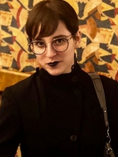
Nikki Lohr
Hometown: New York, NY
Program: 8-week immersion, Graduate
Level: 6, Graduate
Current: Tutor/Substitute, St. Hilda’s & St. Hugh’s School; Gallery Attendant, Dia: Chelsea
What surprised you about your experience at the Middlebury Language Schools?
I was surprised by the students. In college, you meet students who are there for a thousand different reasons and many who aren’t there just for the classes. But at Middlebury, everyone is really excited about learning. In many ways, this is not surprising considering the pledge. But the extent to which this was true did surprise me. There was a pure, unfiltered love of learning that enveloped the campus during the summer, and it was thrilling.
Why did you choose to study at the Middlebury Language Schools?
I applied to Middlebury because of the pledge. I thought the pledge would attract serious language learners and create an exciting intellectual environment. Both proved to be true!
Please describe how your language skills improved due to your studies at Middlebury.
After Middlebury, I received a Platzman Fellowship from the University of Chicago. The grant allows young scholars and professors to do research in the UChicago Special Collections archives. My topic is on how the CIA used abstract art during the Cold War as a form of anti-Soviet propaganda. Some of the sources in the archives are in Russian and I was able to read them — something I couldn’t do when I visited the archives a year ago. Language progress is often hard to feel since the change is gradual, like any kind of growing. But when you can see your progress like I did in the archives, then the work is more than worth it.
What advice would you give someone wanting to attend the School of Russian?
I would just emphasize how impressive the professors and TAs are. They are superb educators, and they are the main reason — even more than the language pledge — for all the progress that Middlebury students see in just 8 weeks.
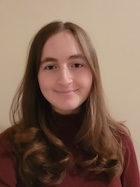
Sophia Maroulis
Hometown: Palo Alto, CA
Program: 4-Week Heritage Program
Current: Educator
Why did you choose to study at our School of Russian?
I grew up in a Russian speaking household. My mom and grandparents emigrated from the Soviet Union when my mom was sixteen. As a result, I understood Russian, but I did not speak with the fluency of someone who lived in Russia. It was important to me to receive formal Russian instruction, but my college did not offer Russian. After researching different programs, Middlebury stood out to me for its Language Pledge, which offered the full immersion I was seeking.
What surprised you about your experience at the School of Russian?
I was surprised by how supportive and non-judgmental the student body was and how quickly I became comfortable speaking in Russian and making mistakes. Everyone is in it together and that sense of camaraderie gets you through the challenging assignments, exams, and moments when you wish you could express yourself in English.
Please describe how your language skills improved due to your studies at Middlebury.
Before Middlebury I was nervous to speak in Russian, I did not understand the case system, and I could not express my thoughts freely. Middlebury changed that. I also benefited tremendously from learning how Russian language and culture has evolved in the post-Soviet era since my family left.
Describe your typical day at the School of Russian.
On a typical day I woke up early to go for a run while it was still cool out. I ate breakfast and tried to alternate days between sitting with old friends and meeting new people from different levels. From 9:00 am to 1:00 pm I attended class. Our amazing instructors taught us a lot of grammar mixed with some new vocabulary words and cultural context. At lunch, I sat with my classmates, and we discussed what we had just learned. After lunch we had an afternoon class from 2:30-3:30 in which half the class did phonetics while the other half did theatre, and we would switch between phonetics and theatre throughout the week. After that, I frequently took a power nap, before beginning homework. Every other day after homework I attended either a club, lecture, or office hours. At dinner, my friends and I often sat with faculty and talked with them. At night, I would study, call my family in Russian for a bit, and try to go to bed by 10:00 or 10:30.
What is one of your favorite memories from your summer at the School of Russian?
My favorite memories from Middlebury were the Tuesday, Thursday, and Sunday nights when Russian tea was open. People from all Russian levels, the PhD students, and the heritage students would gather in the tearoom to drink tea, eat Russian treats from my childhood, talk, play board games, and study for exams together. It was such a happy third space for people to gather and have great late-night conversations.
What advice would you give someone wanting to attend the School of Russian?
Make the most of the resources you have at your disposal while you are on campus. In addition to the phenomenal language instruction you will receive in class, outside of class take advantage of office hours, tutoring, the athletic facilities, career events, and speaking with as many faculty members and students across all levels as possible. You will have the opportunity to meet a lot of really interesting people, some of whom may become great friends or great networking connections.
What are you up to now?
I am a 3rd grade assistant teacher at Gideon Hausner Jewish Day School! I get to educate a wonderful group of students, some of whom speak Russian, and I love speaking with their families in both English and Russian. In my personal life, I use Russian to speak with my loved ones, my friends from Middlebury, and my two Russian-understanding dogs.
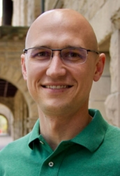
Andrew Postovoit
Hometown: Wiesbaden, Germany
Program: 8-week immersion
Level: 7
Current: Army Officer
What surprised you about your experience at the Middlebury Language Schools?
I was surprised by how many clubs, guest speakers, and activities after class were available.
Why did you choose to study at the Middlebury Language Schools?
I wanted to study at Middlebury because of the School of Russian’s outstanding reputation. I had plateaued in Russian and wanted an intense fully immersive experience to break out to the next level.
Please describe how your language skills improved due to your studies at Middlebury.
Middlebury really increased my confidence in speaking. I also learned about several very helpful resources and how to use them. I still regularly refer to the sources that I encountered at Middlebury.

Tom Woods
Hometown: Bayport, NY
Program: 8-week immersion
Level: 1
Current: Master of International Affairs student at the Bush School of Government and Public Service, Texas A&M University
Why did you choose to study at our School of Russian?
I chose to study at the School of Russian because I was so impressed by the concept of the Language Pledge and the results it produced. I’ve had friends and colleagues who had attended the School of Russian, and the progress that they made over eight weeks was nothing short of incredible. I knew that if I could attain a similar level of success, why wouldn’t I take the opportunity?
What surprised you about your experience at the School of Russian?
I was most surprised by the kindness shared by my fellow School of Russian students, across all levels. At the beginning of the summer, I found it quite challenging to communicate with my peers, with the concepts I was beginning to learn. However, just about every student I spoke to did their best to communicate with me and meet me at the level I was at. This was incredibly beneficial, as it was a “real-world” test of the concepts I learned in class each day. I believe that their generosity was born out of a desire to see their fellow student succeed.
Please describe how your language skills improved due to your studies at Middlebury.
My language skills improved exponentially! At the beginning of the program, I was a true novice. I had no Russian experience whatsoever! Over the course of eight weeks, I gained significant skills in reading, writing, and conversation. The School of Russian has given me an incredible base for my language learning, as I have already been able to utilize these skills to interact with Russian texts in my academic courses, Russian speakers in my daily life, and Russian news and music in my free time. My studies at Middlebury have allowed me to be an active participant in a whole new world of language, that was previously impossible for me, before studying at Middlebury.
What was the most challenging part of your summer?
The most challenging part of my summer was overcoming my previous work habits as a student. In my academic life, I often found that I worked best by myself, without help from others. However, I found that my time at the School of Russian was unlike any academic course I had experienced previously. In this case, the more I worked with others (writing letters, studying vocabulary, or even conversing back and forth), the better off I was as a student. This was a hard pill for me to swallow, as I am someone who likes to work at my own pace. However, once I became more comfortable with the idea that “teamwork makes the dream work”, I began to see my skill level increase, and my comprehension increase in the classroom, as a result.
What is your favorite spot on campus?
My favorite spot on campus is The Grille! It was a perfect “third space”, outside of the classroom and my dorm room. My classmates and I would complete our nightly homework and study for tests in one of the back booths during the week, and then also utilize the same space on the weekends to decompress over an order of mozzarella sticks and a game of pool!
What is one of your favorite memories from your summer at the School of Russian?
One of my favorite memories was our trip to Lake Dunmore. It was also very cool to be able to use the Russian language outside of the typical academic settings. Having a conversation about future plans, while on a kayak in the middle of the lake, was not something I expected to do at the beginning of the summer! Middlebury and the surrounding areas are absolutely beautiful, and Lake Dunmore was a perfect way to experience it!
Describe your typical day at the School of Russian.
My day would often start at around 8:30 am with breakfast at Proctor Dining Hall, right across the street from the Russian dorm in Gifford Hall. I’d make and eat a breakfast sandwich (the panini press and I became fast friends!), then head to Bicentennial Hall before class to brush up on the previous day’s topics with friends for an hour or so. Class was held at Bicentennial Hall as well and began at 10 am. My classmates and I would learn from 10 am-1 pm, at which point we would walk to lunch. The entire Russian School ate lunch at the same time in Ross Dining Hall. I found this to be beneficial, as it allowed my fellow students and me to put each day’s newly learned concept to the test for the first time. At 2:30, it was back to Bicentennial Hall for the last hour of class, which would wrap up the concept that we had learned that day. After class, I would either work on the day’s homework or attend one of the many extracurricular activities that happened each day. One of my favorites was playing on the Russian School volleyball team, which was a great way to not only destress, but also interact with the other language schools on campus as well! After, I’d usually work on homework for about two hours and then head to dinner at Ross around 7 pm. Like lunch, dinner was a group meal with the School of Russian. After dinner, I’d take time to review the vocabulary I had learned that week, and prepare to do it all again the next day!
What advice would you give other level 1 students beginning their summer at the Language Schools?
Open yourself up to every opportunity that comes your way! You’ll be in an entirely new environment, but it is truly the connection with others that helps you to thrive. Also – do your homework! Each day of learning at Middlebury is equivalent to an entire week of learning in a normal higher education environment. The homework is the best way to review what you learned each day and serves to demonstrate what you grasped easily, and what you could use more attention on.
What advice would you give someone wanting to attend the School of Russian?
Go for it! No matter what level of comprehension you are currently at, you will walk away from the School of Russian with a wealth of new knowledge and two full months of opportunity to hone your skills. The immersion of the Language Pledge is like no other program, and the professors and professional staff are second to none. I believe that the learning environment at the School of Russian is something that should be experienced by anyone looking to get a serious boost in their language ability. You won’t regret it!
